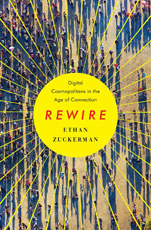"Whether we're concerned with fighting epidemics like SARS or reacting to geopolitical shifts like the Arab Spring, we need a broad, global picture so that we can anticipate threats, seize opportunities, and make connections. The existence of mobile telephony, satellite television, and the Internet suggests that information should be available from throughout the world at unprecedented volumes. Yet a central paradox of this connected age is that while it's easier than ever to share information and perspectives from different parts of the world, we may now often encounter a narrower picture of the world than in less connected days.
"Four decades ago, during the Vietnam War, reporting from the front lines involved transporting exposed film from Southeast Asia by air, then developing and editing it in the United States before broadcasting it days later. In our era, an unfolding crisis, be it a natural disaster or a sudden military coup, can be reported in real time via satellite. Yet, despite these lowered barriers, US television news today features less than half as many international stories as were broadcast in the 1970s.
"With more than two billion people connected to the Internet and six billion people with access to mobile phones, weather reports from rural Mali or reports on the local politics in Bihar are more easily retrieved today than at any time in the past. Our challenge is not access to information; it is the challenge of paying attention. That challenge is made all the more difficult by our deeply ingrained tendency to pay disproportionate attention to phenomena that unfold nearby and directly affect ourselves, our friends, and our families.
"In Six Degrees, his exploration of networked phenomena like epidemics, fads, and financial crises, the mathematician Duncan Watts argues that our lives are affected by phenomena that are geographically distant from us. 'Just because something seems far away, and just because it happens in a language you don't understand, doesn't make it irrelevant,' he argues. 'To misunderstand this is to misunderstand the first great lesson of the connected age: we may all have our own burdens, but like it or not, we must bear each other's burdens as well.'
"This task of bearing one another's burdens forces us to reconsider how we learn about the rest of the world, how we plan strategies and make decisions, how we build our businesses, govern out nations, and educate our youth. None of these changes are simple, but all start from a simple premise. We must begin to understand ourselves not just as citizens of a state or a nation but also as citizens of the world."
